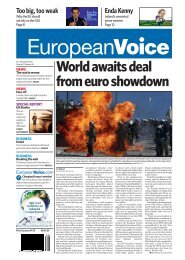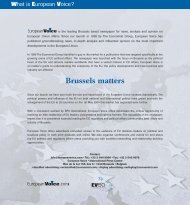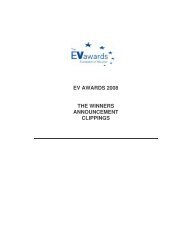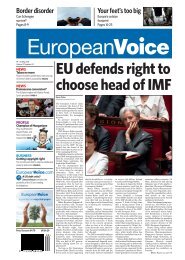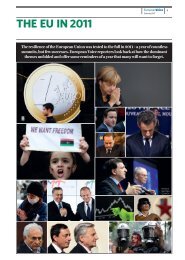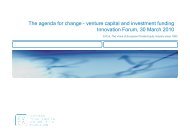special report - European Voice
special report - European Voice
special report - European Voice
You also want an ePaper? Increase the reach of your titles
YUMPU automatically turns print PDFs into web optimized ePapers that Google loves.
30 May 2013<br />
7<br />
ANALYSIS<br />
Trade<br />
Long walk towards monetary union<br />
A swift, drastic clean-up of Europe’s banking<br />
system is needed more than ever.<br />
COMMENT 12<br />
Commissioner takes<br />
tough line with China<br />
Dumping of solar panels<br />
‘part of a wider problem’<br />
Andrew Gardner<br />
andrewgardner@economist.com<br />
Karel De Gucht, the<br />
<strong>European</strong> commissioner<br />
for trade, declared<br />
this week that the<br />
<strong>European</strong> Union’s biggestever<br />
anti-dumping case was<br />
part of a “fundamental debate”<br />
about trading relations<br />
with China.<br />
In a thinly-veined warning<br />
to Germany, he said “if we in<br />
the EU do not stand together<br />
on this, then we will lose”.<br />
His comments, made at an<br />
event organised by <strong>European</strong><br />
<strong>Voice</strong> on Tuesday (28 May),<br />
were targeted at member<br />
states that have criticised the<br />
Commission’s plans to impose<br />
temporary, six-month<br />
punitive tariffs on Chinese<br />
producers of solar panels.<br />
Germany’s economics<br />
minister, Philipp Rösler, said<br />
on 19 May that punitive tariffs<br />
would be “a grave mistake”.<br />
The UK’s minister for<br />
climate action, Greg Barker,<br />
said this Monday (27 May)<br />
that he had written to his EU<br />
counterparts to urge them to<br />
oppose levies. His ministry<br />
said that restrictions on Chinese<br />
imports would put “the<br />
growth of the low-carbon<br />
market across Europe at<br />
risk”.<br />
The Commission must<br />
formally announce its decision<br />
by 6 June, nine months<br />
into an investigation that will<br />
last 15 months. Europe’s imports<br />
of Chinese solar panels<br />
amounted to €21 billion in<br />
2011, making it by far the<br />
biggest trade-defence case<br />
that the Commission has<br />
ever handled.<br />
According to EU trade<br />
rules, a decision on whether<br />
to impose tariffs during the<br />
course of an investigation is<br />
for the Commission to make.<br />
When the investigation is<br />
completed, five-year tariffs<br />
The increasingly rancorous<br />
debate about the<br />
<strong>European</strong> Commission’s<br />
plan to impose punitive<br />
tariffs on Chinese producers<br />
of solar panels has<br />
largely overshadowed the<br />
start of a process that<br />
Commission officials say<br />
could become a steppingstone<br />
to a free-trade deal<br />
with China.<br />
On Thursday (23 May),<br />
the Commission sent EU<br />
member states the details<br />
of the mandate that it<br />
would like to be given for<br />
negotiations with China on<br />
an investment agreement.<br />
The draft of the mandate<br />
has been in the works since<br />
February 2012, when EU<br />
and Chinese leaders gave<br />
can be imposed, but by<br />
member states rather than<br />
by the Commission.<br />
Debating the theme “Is the<br />
EU still a force for open markets?”,<br />
De Gucht told his audience:<br />
“What’s wrong about<br />
this, I believe, is that member<br />
states, already in this<br />
stage of the discussion, they<br />
want to have a predominant<br />
influence on what is happening.<br />
I think that this is completely<br />
contrary to their own<br />
interests.”<br />
He continued: “We all<br />
know that China is trying to<br />
influence and scare off member<br />
states. I think that this<br />
not a good habit...but the<br />
best protection for the member<br />
states is to say that this is<br />
the competence of the <strong>European</strong><br />
Commission.”<br />
The proposal, which was<br />
EU takes a step towards investment agreement with China<br />
their go-ahead for the project.<br />
This would be the first<br />
stand-alone investment<br />
agreement since the <strong>European</strong><br />
Union gained the<br />
power in 2009 to negotiate<br />
investment agreements<br />
on behalf of member<br />
states.<br />
EU officials say that the<br />
negotiations would follow<br />
two tracks. The more important<br />
would address the<br />
“huge” problem of access<br />
to the “long list of closed<br />
sectors” in the Chinese<br />
economy, or to sectors that<br />
are open, but with conditions<br />
attached. The other<br />
track would look at the<br />
protection of investments.<br />
The Commission said<br />
first circulated within the<br />
EU’s institutions in April, has<br />
come under attack chiefly<br />
from ministers in Germany,<br />
Europe’s biggest solar market<br />
and Europe’s chief exporter<br />
to China, and from<br />
the UK, a champion of open<br />
markets.<br />
that most EU member<br />
states have indicated that<br />
they approve of the mandate<br />
as drafted, and said<br />
that it could be finalised<br />
within a couple of months.<br />
It is still, though, looking<br />
for a “clear confirmation<br />
from the top leadership level”<br />
in China that Beijing is<br />
interested in a wide-ranging<br />
agreement. “There has<br />
to be explicit acknowledgement<br />
that market access<br />
will be taken into account,”<br />
an official said.<br />
The EU’s bid to open up<br />
China’s markets is being<br />
launched in a context of<br />
testy trade relations complicated<br />
by efforts by China<br />
to strike trade deals<br />
with the US, South Korea<br />
and Japan.<br />
The conditions that EU<br />
and Chinese companies<br />
experience on each other’s<br />
markets also differs greatly,<br />
as an official acknowledged.<br />
“Because the China<br />
market is so much more<br />
closed than the <strong>European</strong><br />
market, it is clear that<br />
there are some additional<br />
measures that China will<br />
have to make,” he said, noting<br />
too that Chinese investors<br />
do not complain<br />
about the level of protection<br />
provided to Chinese<br />
investors.<br />
Nonetheless, the Commission<br />
says that an agreement<br />
should be of interest<br />
for China, in part because<br />
China is turning into a<br />
Protectionism allegations<br />
Within the solar industry,<br />
opponents of retaliatory tariffs<br />
base their case on the argument<br />
that punitive measures<br />
would shrink the solar<br />
market and therefore harm<br />
the EU’s own interest. However,<br />
the Chinese government<br />
and media routinely<br />
portray this trade-defence<br />
measure as protectionism,<br />
prompting German Chancellor<br />
Angela Merkel to say,<br />
after meeting Chinese Premier<br />
Li Keqiang on Sunday<br />
(26 May), that “protectionism<br />
is not the answer to<br />
globalisation”. She did not<br />
refer to the solar case specifically.<br />
“It is interesting that no<br />
one is putting into question<br />
whether they [Chinese producers]<br />
are dumping,” De<br />
Gucht said of the Commission’s<br />
critics.<br />
The Commission is also<br />
investigating whether subsidies<br />
provided by the Chinese<br />
government to the Chinese<br />
solar industry amount to an<br />
unfair trade practice.<br />
But De Gucht placed the<br />
case in a wider framework,<br />
of overall Chinese industrial<br />
policy. “What [this case] is<br />
about is whether or not they<br />
have to respect a certain<br />
number of disciplines, a certain<br />
number of rules and<br />
conventions that add up<br />
to fair competition. It is<br />
whether we can accept that<br />
they can dump as they wish.”<br />
Some in the <strong>European</strong> solar<br />
industry have suggested<br />
that dumping is largely a<br />
matter of sales of stocks by<br />
companies that are collapsing<br />
as China’s solar industry<br />
consolidates. However, De<br />
Gucht indicated that Chinese<br />
producers’ practice of<br />
selling below cost on foreign<br />
markets followed a pattern<br />
set by the Chinese government.<br />
Dumping, he said, was<br />
“happening in a number of<br />
industrial sectors and it is<br />
very easy to find them: you<br />
read the last five-year plan<br />
[set by the Chinese government]<br />
and you can identify<br />
“capital exporter”. Chinese<br />
investment in Europe has<br />
soared in the past two<br />
years and an agreement<br />
would provide assurances<br />
to China that the EU’s<br />
market will remain open<br />
in the long term.<br />
Much of the benefit for<br />
both sides, the Commission<br />
says, would come<br />
from consolidating the 25<br />
existing bilateral agreements<br />
between China and<br />
member states, some of<br />
which date back to the<br />
1980s.<br />
Officials believe talks will<br />
strengthen “the voices in<br />
the [Chinese] government<br />
that are pleading for further<br />
liberalisation”. One<br />
said that there has been “a<br />
STRONG WORDS Karel<br />
De Gucht, the <strong>European</strong><br />
commissioner for trade.<br />
JENNIFER JACQUEMART<br />
De Gucht: disunited EU will<br />
‘lose’ trade battle with China<br />
them, and it is in those sectors<br />
that it is happening”.<br />
On 15 May, the Commission<br />
warned China that it is<br />
prepared to impose sanctions<br />
on two telecoms equipment-makers,<br />
Huawei and<br />
ZTE Corp, if the Commission<br />
concludes that they received<br />
illegal subsidies or<br />
dumped their products on<br />
the <strong>European</strong> market.<br />
De Gucht, who later indirectly<br />
referred to China as<br />
“our fiercest competition on<br />
almost all our markets”, said:<br />
“Member states should realise<br />
that when they try to<br />
weaken the <strong>European</strong> Commission,<br />
first of all they are<br />
weakening themselves.”<br />
For more, go to<br />
www.europeanvoice.com/<br />
open_markets<br />
leap in liberalisation and<br />
that has turned out well for<br />
China and there is a realisation<br />
that continuation is<br />
good for them”.<br />
A UK government<br />
source welcomed the bid<br />
to secure an investment<br />
agenda, though his comments<br />
came before he had<br />
seen the mandate. “The<br />
EU’s trade relationship<br />
with China has been a bit<br />
less than the sum of its<br />
parts...It has lacked the<br />
weight that you get when<br />
you are in negotiations<br />
with people.” Talks on the<br />
investment agreement<br />
“will thicken out the relationship,<br />
not just the content”.<br />
Andrew Gardner



